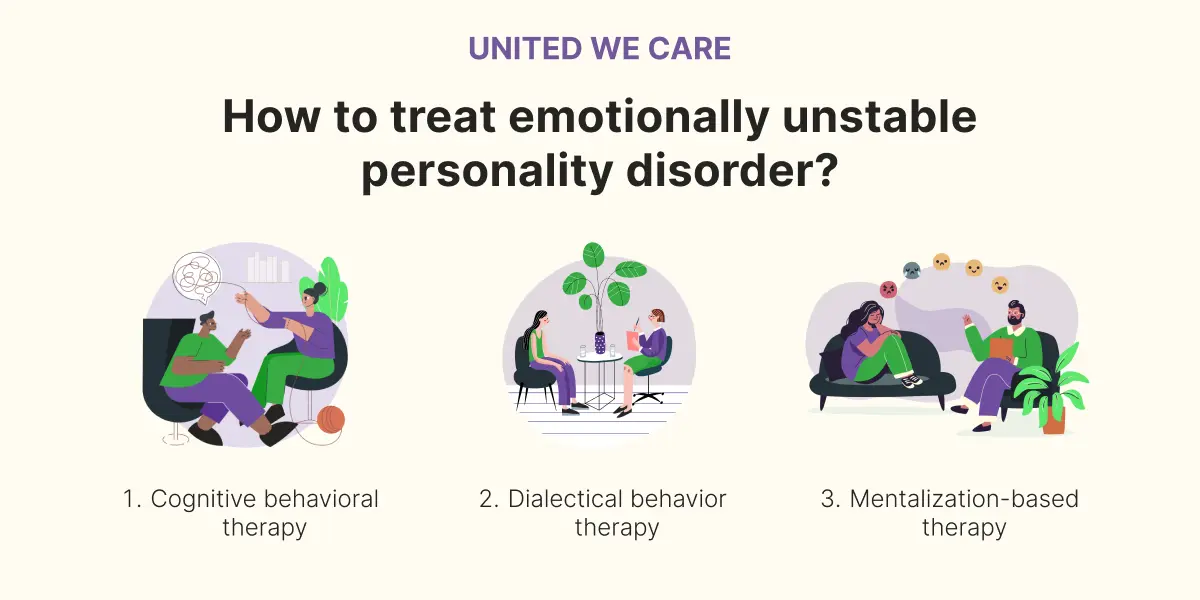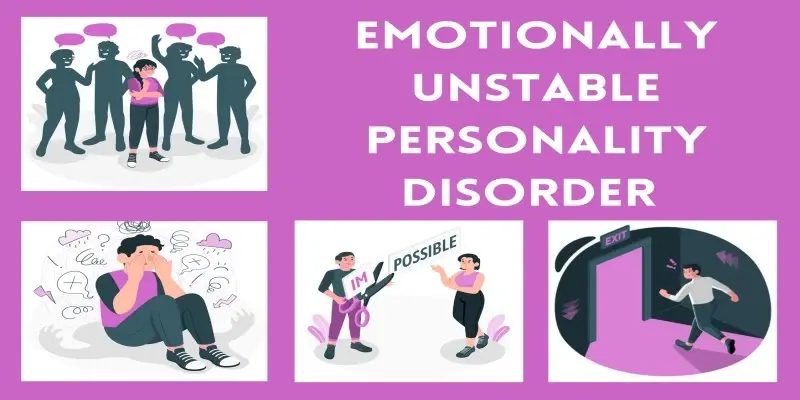Introduction
Emotional ups and downs are an important part of our lives as they help us grow and become resilient. These fluctuations in our emotions not only help us understand ourselves and others better but also help us adapt and come out stronger from challenging situations. However, for some individuals, these emotions can feel like a rollercoaster ride, meaning that the ups and downs are rather intensified and can negatively affect their well-being and relationships. Due to the nature and symptoms of this condition, it is known as Emotionally Unstable Personality Disorder (EUPD).
Living with EUPD is often challenging, but with awareness and the right support, it is possible to live a healthy and happy life. In this blog, we’ll dig into the symptoms, causes, and treatment of this condition.
What is emotionally unstable personality disorder?
EUPD, also known as Borderline Personality Disorder (BPD), is characterized by an intense instability in a person’s emotions, relationships, and self-image and increased impulsivity and reactivity.[1]
One of the core issues for people with EUPD is their fear of abandonment. This means that they’re always on the lookout for people leaving them high and dry, and they’ll try their best to avoid being abandoned at any cost by engaging in behaviors such as love bombing or ghosting.
Symptoms of emotionally unstable personality disorder
It is estimated that 8.6% of the population in India suffers from EUPD. [2] If you have EUPD, understanding its symptoms and how they affect you can help you find the right kind of support for your well-being. Ask yourself the following questions to understand your symptoms better:
- Do you shift between extremes?
This could be in the form of labeling people, things, or situations as all good or all bad, leaving no room for a middle ground.
- Are most of your relationships intense and unstable?
If you engage in patterns of idealizing and devaluing people, it can result in tumultuous relationships.
- Do you react disproportionately to challenging situations?
This could manifest as intense, inappropriate, and uncontrolled fits of rage.
- How do you view yourself?
Feeling fundamentally flawed or worthless can lead to you frequently changing your goals, values, and identity.
- Do you constantly feel like people will abandon you?
Whether real or imagined, this fear can push you to become overly dependent and clingy by constantly seeking reassurance and attention from others.
- Are you impulsive?
This could be in the form of binge eating, overspending, reckless driving, substance abuse, self-harm actions, etc.
- Do you feel like you’re often spaced out?
You might feel disconnected from your thoughts, feelings, and surroundings for prolonged periods. [3]
What causes emotionally unstable personality disorder?
The development of EUPD can be due to heredity, differences in brain functioning, dysfunctional environment in childhood, or societal factors.
Research suggests that if you have a parent or a close relative with EUPD, you have a higher chance of developing it, too. [4] This is because genetic traits such as impulsivity and emotional regulation can be inherited, which may contribute to the development of this disorder.
Being physically, emotionally, or sexually abused in childhood, or experiencing neglect or the loss of parents at an early age can significantly contribute towards the kind of emotional regulation and coping mechanisms seen in EUPD. [5] Similarly, if you grew up with emotionally immature parents who were not accepting of your emotions, you may struggle to regulate your emotions, which can contribute to the development of EUPD.
If you have EUPD, you may also have differences in the structure and function of your brain, such as the prefrontal cortex, the amygdala, and the hippocampus. These areas of the brain are responsible for the way you regulate emotions, control impulses, and make decisions. An imbalance in neurotransmitters such as serotonin, which is one of the happy hormones, is also closely linked to mood disorders.
If you’ve grown up amidst war, displacement, or communal friction, the chronic stress and trauma from such environments can significantly impact your emotional development and increase the likelihood of developing EUPD.
How to treat emotionally unstable personality disorder?
Getting diagnosed with EUPD is the first step in treating it. Your doctor will conduct a comprehensive evaluation to rule out any other mental disorders. Once you get your official diagnosis, depending on the severity of your symptoms, the doctor will suggest a combination of psychotherapy, medication, and lifestyle changes as part of your treatment plan.
Psychotherapy has been proven the most effective in the treatment of EUPD. You may be engaged in one of the following approaches:

- Cognitive behavioral therapy: CBT focuses on identifying and altering core beliefs and thought patterns that are inaccurate and do not serve you to those that do. As you change your thoughts, you are able to change your reactions as you learn to regulate your emotions better.
- Dialectical behavior therapy: DBT focuses on teaching you skills to manage the intensity of your emotions, improve your relationships, and prevent you from harming yourself.
- Mentalization-based therapy: One of the main struggles of EUPD is that you may not be able to understand the thoughts, feelings, and emotions of others correctly. MBT can help you take a step back and assess whether what you’re interpreting is useful and realistic.
Your doctor may also prescribe you antidepressants or mood stabilizers to treat symptoms such as depression, anxiety, impulsivity, and mood swings.
Some self-help strategies you can try to reduce your symptoms are getting good sleep, eating healthy, and incorporating exercise into your daily routine. You can manage stress by deep breathing and becoming more mindful of your emotional states with meditation.
Conclusion
Living with EUPD can feel like surfing on tidal waves, with one minute being on the top and the next being thrown underwater. Having more emotional intensity that lasts for days and weeks, not having an accurate perception of yourself and others, and not being able to form authentic connections are all characteristics of EUPD. Not getting diagnosed and treated for your condition can result in people feeling emotionally drained and distancing themselves from you. This can add to your already existing fear of abandonment and actually make you feel more lonely. Hence, it is important to understand how the symptoms of EUPD show up for you so that you can seek the right support for it. It is important to get evaluated and diagnosed by a doctor. Once diagnosed, along with psychotherapy, you may also try self-help strategies such as lifestyle changes and techniques for you to be more relaxed and mindful. Book a session with one of our mental health experts to help you navigate through emotional instability. At United We Care, we offer the most appropriate, clinically backed solutions for all your well-being needs.
References:
[1] American Psychological Association, “Borderline Personality Disorder,” in APA Dictionary of Psychology. [Online]. Available: https://dictionary.apa.org/borderline-personality-disorder. Accessed: Nov. 15, 2023
[2] Sharan P. (2010). An overview of Indian research in personality disorders. Indian journal of psychiatry, 52(Suppl 1), S250–S254. https://doi.org/10.4103/0019-5545.69241. Accessed: Nov. 15, 2023
[3] “Borderline Personality Disorder,” National Alliance on Mental Illness (NAMI), https://www.nami.org/About-Mental-Illness/Mental-Health-Conditions/Borderline-Personality-Disorder. Accessed: Nov. 15, 2023
[4] Svenn Torgersen, GENETICS OF PATIENTS WITH BORDERLINE PERSONALITY DISORDER, Psychiatric Clinics of North America, Volume 23, Issue 1, 2000, Pages 1-9, ISSN 0193-953X, https://doi.org/10.1016/S0193-953X(05)70139-8. Accessed: Nov. 15, 2023
[5] Ball, J.S., Links, P.S. Borderline personality disorder and childhood trauma: Evidence for a causal relationship. Curr Psychiatry Rep 11, 63–68 (2009). https://doi.org/10.1007/s11920-009-0010-4 Accessed: Nov. 15, 2023









